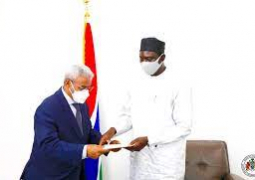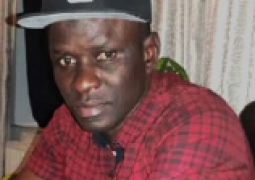The applicants in the case are as follows: Emil Touray, Saikou Jammeh, Haji Suwareh and Isatou Susso. The four were represented by Lawyers Gaye Sowe, Executive Director of the Institute for Human Rights and Development in Africa (IHRDA), Hawa Sisay Sabally and Sagar Jahateh.
The Gambia as the respondent in the case, was represented by Honourable Dawda A. Jallow, the Attorney General and Minister for Justice, Cherno Marenah, the former Solicitor General and Legal Secretary, Dinshiya Binga, Director of Civil Litigation and International Law, Kimbeng T. Tah, Principal State Counsel (now Deputy Director of Civil Litigation), Aji Adam Ceesay, Senior State Counsel, Ms Ella R. Dougan, Senior State Counsel and Momodou M. Mballow, Senior State Counsel.
In respect of the case, the court composed of Imani D. Aboud as the President, Blaise Tchikaya as Vice President, Ben Kioko, Rafaa Ben Achour, Suzanne Mengue, M-Therese Mukamulisa, Tujilane R. Chizumila, Chafika Bensaoula, Stella I. Anukam, Dumisa B. Ntsebeza, Modibo Sacko as judges.
On the facts of the case, Haji Suwareh and Isatou Susso were members of the defunct 3 Years Jotna group and on the 9th May 2019 submitted an application to the Inspector General of Police of the Gambia for authorisation for a permit under section 5 of the Public Order Act of the Gambia to hold a peaceful protest.
Having not received a response, on the 10th May 2019, the group assembled at the Senegambia area with the intention of holding the protest.
However, they were arrested by the police and later charged with the offences of “unlawful assembly, “conduct likely to cause breach of peace” and “conspiracy to commit offences (felony)”.
The group subsequently re-applied for a permit (licence) to hold the protest but never received a response. On the 9th July 2019, the group was informed by the police that the charges levelled against them had been dropped.
Moreover, the applicants wanted the court to make a declaration that section 5 of the Public Order Act of the Gambia is a violation of the right to freedom of assembly under Article 11 of the Charter and Article 21 of International Covenant on Civil and Political Rights (ICCPR).
The applicants on the other hand wanted the court to make declaration that section 5 of the Public Order Act is a violation of the right to freedom of expression under Article 9(2) of the Charter and Article 19(2) of ICCPR.
Furthermore, they asked the court to declare that the rights of Haji Suwareh and Isatou Susso under Article 11 of the Charter and Article 21 of the ICCPR on one hand, and further under Article 9(2) of the Charter and 19(2) of the ICCPR on the other hand, were violated by the disbandment of the 10 May 2019 protest and their subsequent arrest.
In addition, the applicants asked the court to make declaration that the Republic of the Gambia has violated Articles 1 of the Charter and 2(2) of the ICCPR. Also, they asked the court to order the Republic of the Gambia to immediately repeal or amend Section 5 of the Public Order Act to align with provisions of Articles 9(2) and 11 of the Charter and Articles 19(2) and 21 of the ICCPR.
Jurisdiction of the Court
For the first claim, the applicants were required to go to the Supreme Court of the Gambia to challenge the constitutionality of the Public Order Act. However, the applicants said the Supreme Court already decided the matter in another matter involving Ousainou Darboe and 18 others challenging the constitutionality of section 5 of the Public Order Act and held that it was consistent with the 1997 Constitution of The Gambia.
The African Court held that the Applicants could not have been expected to also seize the Supreme Court, the highest court in The Gambia, as there would have been no prospect of success, making the remedy ineffective.
Back to the first claim, which was the issue for determination, the court held that the claim against section 5 of the Public Order Act of The Gambia has been settled in accordance with principles of the Charter and therefore, the Application fails to meet the requirement set out under Article 56(7) of the Charter and Rule 50(2)(g) of the Rules and was declared inadmissible.




